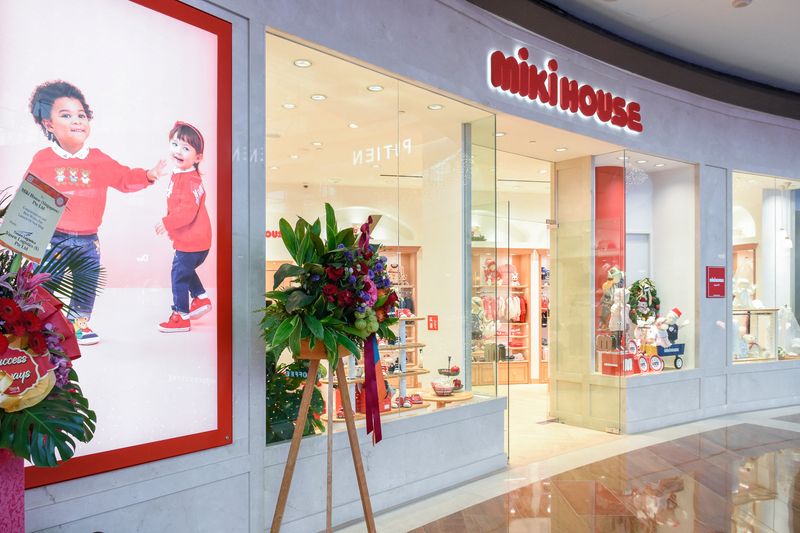By Miho Uranaka and Rocky Swift
TOKYO (Reuters) - Japan's Miki House, a maker of luxury baby and children's goods in a country with ever-fewer births, is looking overseas for both production and customers for products like its 100,000 yen ($760.40) Gold Label brand pyjamas.
President Koichi Kimura said the Osaka-based company, which has developed a global reputation based on Japanese technology and quality, has turned beyond its shores as the population ages and its workforce shrinks.
"As much as possible, we want to produce here," he told Reuters in an interview, referring to a network of 200 domestic partner factories. "'Made in Japan' would be my wish, but it's not easy, because the craftsmen are gone."
Privately-owned Miki House, like other Japanese companies, is contending with a shrinking workforce, with an estimated shortage of 3.41 million workers by 2030, according to labour policy research group Recruit Works Institute.
The clothier has endeared itself to generations of parents with attention to detail, such as techniques in attaching buttons to keep them from becoming a choking hazard.
But as Japan's population ages, there's less demand for products like its 242,000 yen white goose down coats for toddlers who will soon outgrow them.
When Kimura founded Miki House in 1971, Japan had about 2.6 million births a year and was undergoing a rapid economic expansion that prompted parents to splurge on fashionable goods for their youngsters.
In 2022, the nation reported fewer than 800,000 births, the lowest on record.
PRODUCTION SHIFTS
Japan's Fast Retailing, the nation's biggest clothing seller and owner of bargain brand Uniqlo, manufactures almost all of its products overseas.
At Miki House, about 70% of products are still made domestically, but some items, such as children's shoes, cannot be made locally at scale and are manufactured in Vietnam.
Demand is shifting too, with about 60% of sales coming from overseas, where Miki House operates 95 stores in 16 countries and regions.
The brand's Japanese heritage helps support its quality position and higher prices, said Neil Saunders, a retail analyst at GlobalData.
"Moving production overseas runs a very minor risk of undermining the cultural association with Japan, but the bigger challenge will be to ensure there is no dilution in production standards or product quality," he added.
Miki House, which recorded 17.2 billion yen in sales in the year through February 2022, has been profitable in the past two years after posting a loss in fiscal 2019, it said, without disclosing figures. It could pursue a public listing if it achieves stable profit growth, Kimura said.
The company is hoping that a post-pandemic travel rebound will boost purchases from tourists to Japan to 25% of total sales by 2025. The same goods are nearly 50% cheaper in Japan, due to differences in duties and transportation costs, compounded by a weak yen.
To address the declining birthrate, the Japanese government could do more to help families with childcare, Kimura said, but Miki House is not banking on an immediate turnaround.
"We need to balance that decline by going overseas," he added. "After 52 years in business, we've now finally got that balance right."

($1 = 131.5100 yen)
(This story has been officially corrected to fix first name to Koichi, not Hisaichi, in paragraph 2)